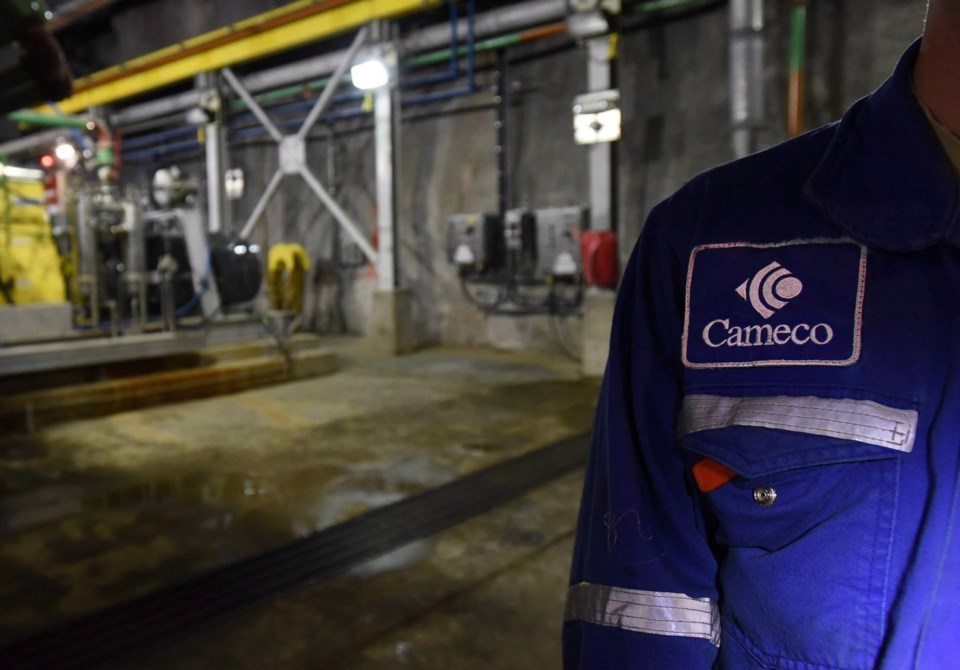The chief executive of Saskatchewan-based uranium miner Cameco Corp. is encouraging investors to tune out the "noise" from global trade and geopolitical upheaval and instead focus on the strong outlook for nuclear power demand.
"There is no doubt that those distractions have created new and unexpected risks that must be carefully monitored and diligently managed," Tim Gitzel told analysts on a conference call to discuss the company's first-quarter results.
Canadian uranium is exempt from 10 per cent U.S. tariffs on energy imports because it adheres to the free-trade agreement between Canada, the U.S. and Mexico. But on the conference call, Gitzel said "we know that a lot can change overnight."
Separately, the U.S. administration is also investigating the national security implications of imported uranium and other minerals. After a similar probe during U.S. President Donald Trump's first term in 2019, which ultimately spared uranium, Cameco took steps to protect itself, such as looking at contract terms and delivery timelines.
"Those pre-emptive actions helped us prepare for the more recent threat of tariffs on Canadian nuclear fuel products, and we will continue to adapt accordingly and mitigate such risks in the future," Gitzel said.
"I'm sure there will be more to come this year as negotiations continue and policies evolve, but two things are certain: There's no substitute for uranium in a nuclear fuel bundle and there's no elasticity to the demand for nuclear fuel. You need it to run your reactors and power your economy, regardless of tariffs or higher cost."
Gitzel pointed to a bevy of non-tariffs developments on the global stage that paint a rosier picture for the sector. Reactor operating licences are being extended in the United States, some to 80 years. China approved ten new reactor builds for the fourth year in a row. And Poland signed an agreement for its first commercial nuclear plant.
Yet Gitzel said 70 per cent of the uranium supply that reactors around the world will need for the next two decades has not been purchased under long-term contracts due to the global trade uncertainty.
"To meet the total fuel requirements of the world reactors between now and 2045, the world's utilities still have a lot of uranium to buy," he said.
The World Nuclear Association says Canada is the globe's second-biggest producer of uranium after Kazakhstan. Most of Canada's uranium reserves are in northern Saskatchewan.
Earlier Thursday, Saskatoon-based Cameco said it earned a profit attributable to equity holders of $70 million or 16 cents per diluted share for the quarter ended March 31, compared with a loss of $7 million or two cents per diluted share a year earlier.
On an adjusted basis, Cameco says it earned 16 cents per diluted share in its latest quarter, up from an adjusted profit of 11 cents per diluted share a year earlier.
Revenue for the quarter totalled $789 million, up from $634 million a year earlier.
Uranium production totalled six million pounds for the quarter, up from 5.8 million pounds a year earlier, while sales volumes amounted to 6.9 million pounds, down from 7.3 million pounds. Cameco's average realized price for uranium was $89.12 per pound, up from $77.33 a year earlier.
Cameco's fuel services business saw production of 3.9 million kilograms, up from 3.7 million a year earlier, while fuel services sales volumes totalled 2.4 million kilograms, up from 1.5 million kilograms. Fuel services reported an average realized price of $56.64 per kilogram, up from $48.36 in the first quarter of 2024.
This report by The Canadian Press was first published May 1, 2025.
Companies in this story: (TSX: CCO)
Lauren Krugel, The Canadian Press




